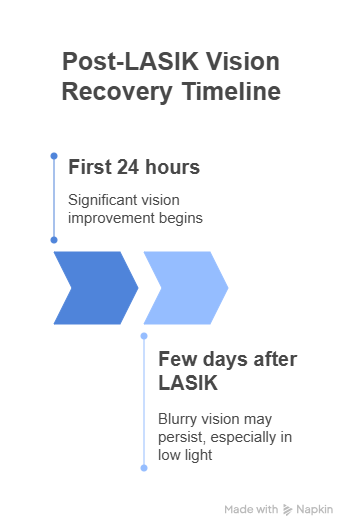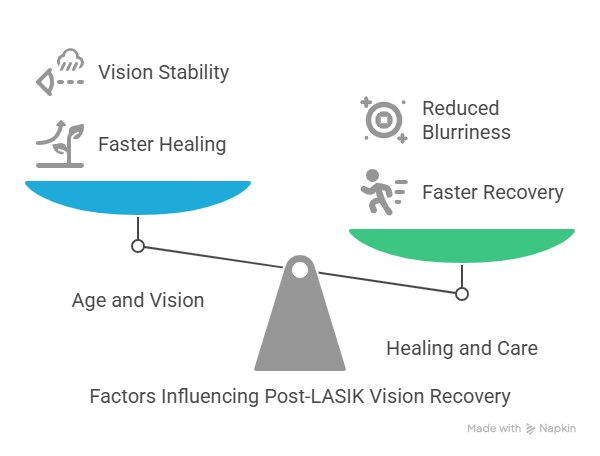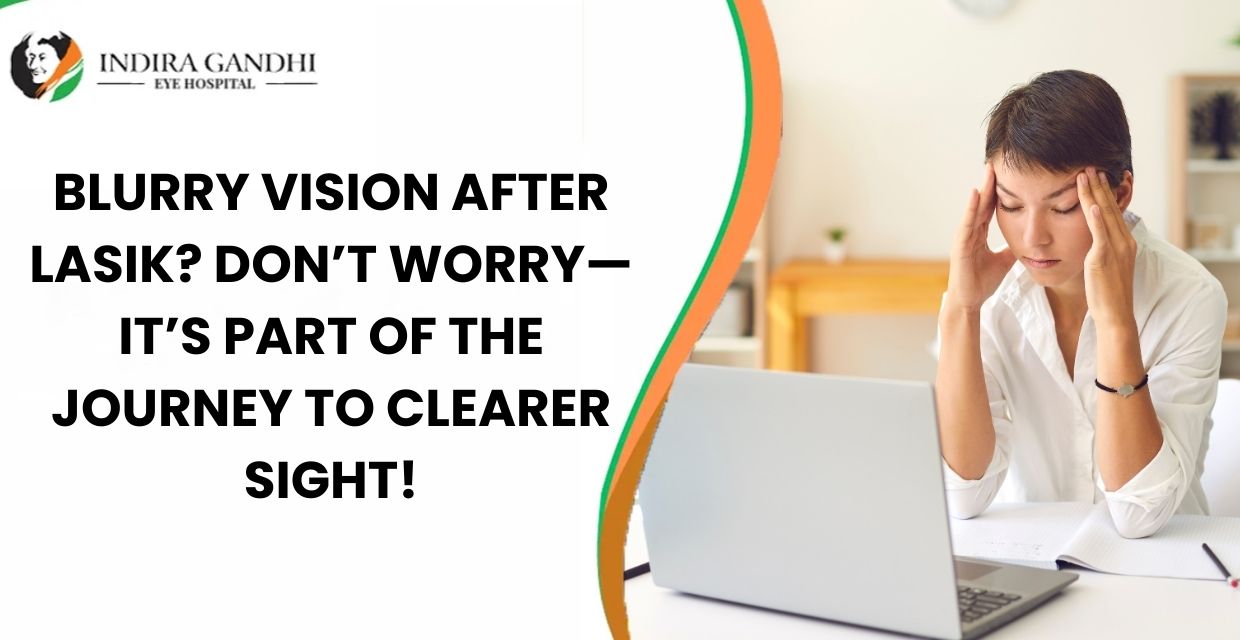|
Getting your Trinity Audio player ready...
|
LASIK surgery is one of the most popular and effective eye surgeries to correct vision problems such as nearsightedness, farsightedness, and astigmatism. This procedure is well-known for its quick recovery time and high success rate, making it an ideal choice for many people seeking to improve their vision. However, a common question that many patients have post-surgery is: how long will my vision be blurry after LASIK?
Understanding what to expect after the procedure can help ease any concerns and ensure a smooth recovery. In this blog, we will explore how long will my vision be blurry after LASIK, what causes temporary blurry vision, and the steps you can take to ensure the best possible results after your LASIK surgery.
What is LASIK Surgery?
LASIK, which stands for Laser-Assisted in Situ Keratomileusis, is a type of refractive eye surgery used to correct common vision problems such as nearsightedness (myopia), farsightedness (hyperopia), and astigmatism. The procedure involves reshaping the cornea, the transparent front part of the eye, using a laser to improve how light enters the eye. By reshaping the cornea, LASIK helps the light focus more accurately on the retina, leading to clearer vision without the need for glasses or contact lenses.
LASIK surgery is typically an outpatient procedure, meaning it takes less than an hour and does not require a hospital stay. The recovery time is generally quick, with most patients experiencing a significant improvement in their vision within a few days. However, just like any surgical procedure, LASIK comes with its set of expectations and potential side effects, including temporary blurry vision.
How Long Will My Vision Be Blurry After LASIK?
One of the most common questions asked by LASIK patients is: how long will my vision be blurry after LASIK? It’s essential to understand that blurry vision after LASIK is a normal part of the healing process. In the first few hours after the surgery, you may experience mild to moderate blurry vision, which should gradually improve over time. However, the exact duration of blurry vision can vary from person to person, depending on various factors.
Here’s a breakdown of what to expect after your LASIK surgery:
1. Immediate Post-Surgery Blurriness (First Few Hours)
After the LASIK procedure, most patients notice some blurry vision immediately. The initial blurry vision can be attributed to several factors, such as the residual effects of the surgery, the eye’s healing process, and the use of lubricating eye drops.
- What to Expect: In the first few hours after LASIK, your eyes may feel dry, scratchy, and watery, and your vision might be blurry or hazy. This is a temporary effect and usually resolves within a few hours to a day.
- Why It Happens: The cornea is temporarily altered during the surgery, and the eye needs time to adjust and heal. The blurry vision should gradually improve as your eyes adapt to the changes.
2. Blurry Vision in the First Few Days (1-3 Days Post-Surgery)

In the first few days following LASIK, some patients may still experience blurred vision, especially during activities like reading, driving, or watching TV. However, the majority of patients start to see significant improvement in their vision after the first 24 hours.
- What to Expect: The blurry vision may persist for a few days, especially in low-light conditions. You may notice some fluctuations in your vision as your eyes heal. It’s common to experience clearer vision at certain times of the day and blurriness at other times.
- Why It Happens: Your eyes are still healing, and your brain is adjusting to the newly shaped cornea. This process may take time, and the blurry vision should improve steadily.
3. Moderate Blurriness in the First Week (1 Week Post-Surgery)
By the end of the first week, many patients begin to see much better results. However, some people may still experience mild to moderate blurry vision, particularly during the night or in dim lighting conditions. This is normal and should not be a cause for concern.
- What to Expect: You may experience halos, starbursts, or glare around lights, especially at night. These visual disturbances often improve as the healing process progresses.
- Why It Happens: This is a result of the healing process and the adjustments your eyes are making. It typically gets better over time as your cornea stabilizes.
4. Continued Improvement in the First Month (1 Month Post-Surgery)
For most patients, how long will my vision be blurry after LASIK should be noticeably improved within the first month. By the end of the first month, the vast majority of LASIK patients experience significant improvements in their vision. However, it’s normal for some minor blurry vision or visual disturbances to persist during this time.
- What to Expect: The blurry vision will continue to decrease, and you will notice clearer vision for most activities. Your eyes will continue to heal and adjust to their new shape.
- Why It Happens: The cornea is still undergoing minor changes and adjustments. The eye continues to heal, and minor fluctuations in vision are expected as your eye stabilizes.
Blurry After LASIK? Find Out When It Clears – With Guidance from Top Eye Doctors!
Make An Appointment5. Long-Term Stability and Minimal Blurriness (3-6 Months Post-Surgery)
For most LASIK patients, vision continues to improve for the first three to six months. Any remaining blurry vision or disturbances will likely be minimal and can be corrected with a follow-up visit to your ophthalmologist.
- What to Expect: By three to six months, the majority of patients have stable, clear vision. Any residual blurry vision will likely resolve during this time, and you will likely notice an overall improvement in your quality of vision.
- Why It Happens: The healing process is almost complete, and your eyes have fully adjusted to the new shape of the cornea.
Factors That Affect How Long Blurry Vision Lasts After LASIK

Several factors can influence how long your vision will be blurry after LASIK. These include:
- Age: Younger patients often heal faster and may experience less blurry vision post-surgery compared to older patients.
- Pre-Surgery Vision: If you had more severe refractive errors before the surgery, it may take a little longer for your vision to stabilize.
- Healing Process: Each person heals at a different rate. Some individuals may experience faster recovery than others.
- Post-Surgery Care: Following post-surgery care instructions closely, such as using prescribed eye drops and avoiding rubbing your eyes, can contribute to a faster recovery and reduce the duration of blurry vision.
When to Seek Medical Attention
While some blurry vision after LASIK is normal, there are certain signs that require medical attention. If you experience any of the following, contact your eye doctor immediately:
- Significant pain or discomfort that does not improve with over-the-counter medication.
- Sudden vision loss or significant visual disturbances that do not improve.
- Persistent blurry vision that does not improve over time.
- Redness, swelling, or discharge from the eye.
Conclusion
In conclusion, how long will my vision be blurry after LASIK depends on various factors, including the individual’s healing process and the severity of their refractive error before surgery. In most cases, blurry vision is temporary and should resolve within a few days to a few weeks. However, some minor visual disturbances may persist for up to six months as the eyes fully heal. By following proper post-surgery care instructions and attending follow-up appointments, you can help ensure that your vision improves steadily.
If you are concerned about your recovery after LASIK or have any questions about how long will my vision be blurry after LASIK, don’t hesitate to consult with your ophthalmologist. IGEHRC is dedicated to providing expert care and guidance during your LASIK journey, ensuring that you achieve the best possible vision outcome.












